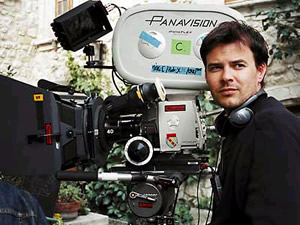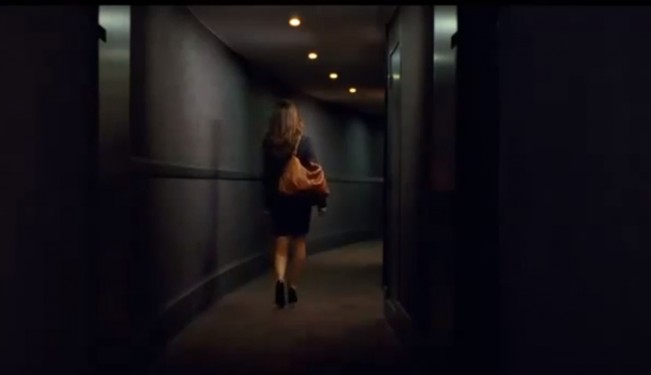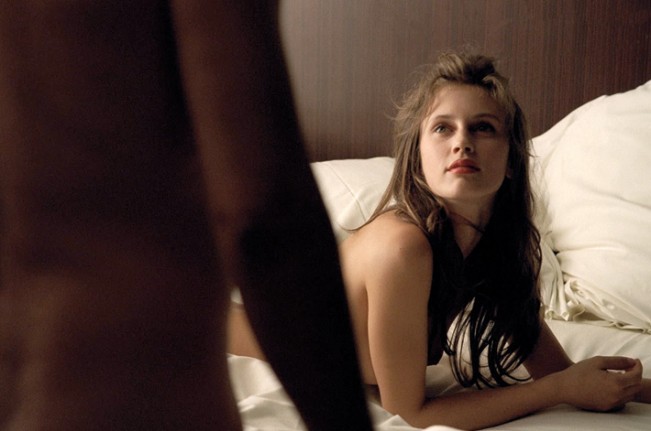By Jake Howell jake.howell@utoronto.ca
Countdown To Cannes: François Ozon
FRANÇOIS OZON
Background: French; born Paris, France 1967.
Known for / style: 8 Women (2002), Swimming Pool (2003), In the House (2012); films with liberal philosophy towards sexuality, gay and lesbian themes, working with a repertory that includes Charlotte Rampling, Catherine Deneuve, Valeria Bruni-Tedeschi and Melvil Poupaud.
 Notable accolades: Given his embrace of LGBT themes, a substantial sheaf of Ozon’s awards have come from events like the San Francisco Lesbian and Gay Film Festival (2006’s Frameline award), L.A. Outfest (2000’s Grand Jury Prize for 1999’s Criminal Lovers), and the New York Lesbian and Gay Film Festival (2000’s Best Feature award for Water Drops on Burning Rocks). Outside of those festivals, In the House did well in the general circuit, picking up the Jury Prize for Best Screenplay and the Golden Seashell at San Sebastián, while winning the FIPRESCI prize at TIFF.
Notable accolades: Given his embrace of LGBT themes, a substantial sheaf of Ozon’s awards have come from events like the San Francisco Lesbian and Gay Film Festival (2006’s Frameline award), L.A. Outfest (2000’s Grand Jury Prize for 1999’s Criminal Lovers), and the New York Lesbian and Gay Film Festival (2000’s Best Feature award for Water Drops on Burning Rocks). Outside of those festivals, In the House did well in the general circuit, picking up the Jury Prize for Best Screenplay and the Golden Seashell at San Sebastián, while winning the FIPRESCI prize at TIFF.
Film he’s bringing to Cannes: Jeune et Jolie (Young and Beautiful), a sexy drama depicting four seasons in the life of a 17-year-old girl. That may sound vague, but the film’s trailer implies prostitution (or other sexual grey areas) as the film’s subject. Upcoming French actress Marina Vacth plays the young and beautiful lead, with Charlotte Rampling, Frédéric Pierrot, Géraldine Pailhas, and Nathalie Richard cast in supporting roles. Jeune et Jolie marks the fourth time Ozon has worked with Rampling.
Previous Cannes appearances: After two sidebar premieres (short A Summer Dress hit the Croisette in 1996; Sitcom played in 1998), Ozon joined the Competition for 2003’s Swimming Pool, with 2005’s Time to Leave unspooling in Un Certain Regard. Ozon’s most recent film to debut at the Festival is 2006’s A Curtain Raiser, a short that played Out of Competition.
 Could it win the Palme? Unlikely. Ozon has yet to strike gold at Cannes, and this year holds no real indication that this will change. Echoing this is an April 19 Vulture article, “Can Hollywood Understand French Director François Ozon?,” which underlines the uncertainty of Ozon’s Palme potential. In other words, with Steven Spielberg’s jury set to judge the Competition, Vulture may as well have titled their article: “Can Steven Spielberg Understand François Ozon?” Furthermore, we know that Jeune et Jolie is carried by a relatively unknown lead actress, which makes it harder to have utter confidence in the film’s acting (of course, Charlotte Rampling’s supporting role should minimize that variable). As it stands, courting the Hollywood giant could prove difficult for Ozon; on the other hand, the fifty-second preview for Jeune et Jolie is sleek and sexy.
Could it win the Palme? Unlikely. Ozon has yet to strike gold at Cannes, and this year holds no real indication that this will change. Echoing this is an April 19 Vulture article, “Can Hollywood Understand French Director François Ozon?,” which underlines the uncertainty of Ozon’s Palme potential. In other words, with Steven Spielberg’s jury set to judge the Competition, Vulture may as well have titled their article: “Can Steven Spielberg Understand François Ozon?” Furthermore, we know that Jeune et Jolie is carried by a relatively unknown lead actress, which makes it harder to have utter confidence in the film’s acting (of course, Charlotte Rampling’s supporting role should minimize that variable). As it stands, courting the Hollywood giant could prove difficult for Ozon; on the other hand, the fifty-second preview for Jeune et Jolie is sleek and sexy.
Why you should care: Ozon was once known as the enfant terrible of French cinema, an intriguing title that says much about the director’s provocative filmography. Having cranked out a film almost annually for the past 16 years, the productive Ozon has found some mainstream success touring the festival circuit with In the House, which opened in New York and Los Angeles last week. As for Jeune et Jolie, well…having watched the beguiling teaser (and it is a tease) the film strikes me as having the potential to be both elegant and mysterious, with a dash of carnal pleasure. Who would say no?
Follow Jake Howell on Twitter: @Jake_Howell


















I think that unlike two-time winner Haneke, a European auteur who has won lots of North American fans, Ozon’s sexual politics don’t really translate beyond LGBT fan bases. So a Palme win seems unlikely, in my humble opinion, if Spielberg carries any influence.